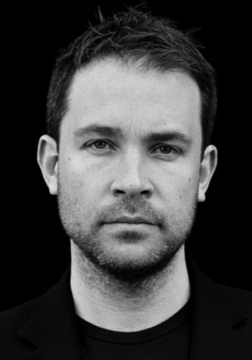Trevor Baca
American composer Trevor Bača (*1975) grew up in Texas. His concerns as a composer include lost and secret texts; broken and dismembered systems; sorcery, divination and magic; and the effects, action and beauty of light. Bača’s music has been played throughout the world with recent performances in Barcelona, Berlin, Boston, Cincinnati, Cologne, Curitiba, Darmstadt, Helsinki, Huddersfield, Leuven, Ljubljana, Los Angeles, Lyon, Maastricht, New York, San Diego, San Francisco, Thessaloniki, Tokyo, Trieste, Würzburg and elsewhere.
Bača’s music has been played by soloists and ensembles around the world. Ensembles include the Argento Ensemble (New York); Callithumpian Consort (Boston); the Debussy Trio (Los Angeles); Distractfold (Manchester); Either/Or (New York); Ensemble Dal Niente (Chicago); Ensemble Echoi (San Diego); Ensemble Mosaik (Berlin); ensemble recherche (Freiburg); Ensemble SurPlus (Freiburg); manufaktur für aktuelle musik (Cologne); Talea Ensemble (New York); and others. Soloists include Brian Archinal (Bern); Séverine Ballon (Paris); Nico Couck (Antwerp); Madison Greenstone (San Diego); Richard Haynes (Bern); Jonathan Hepfer (Los Angeles); Marc Horne (Barcelona); Carin Levine (Bremen); Reiko Manabe (Tokyo); Mark Menzies (Los Angeles); Corrado Rojac (Trieste); Jürgen Ruck (Würzburg); Jessi Rosinski (Boston); Alan Toda-Ambaras (Boston); Alice Teyssier (New York); Elizabeth Weisser (New York); and others.
Recent publications include “Abjad: an open-source system for formalized score control,” published in the proceedings of First International Conference on Technologies for Music Notation and Representation, at IRCAM / Sorbonne in Paris; “Nature, song, transfiguration,” a critical introduction to the instrumental music of Chaya Czernowin, published by Schott Music, in Mainz; “Music composition and the technologies of working together,” an assessment of open-source technologies for collaborative composition, in the journal Ideas Sónicas, in Mexico City; “Breath, blood, network of nerves: an accidental body poetics,” that theorizes the in-motion body and its parts; and “Unremitting ambiguity,” an analysis of The Flypaper, by composer Steven Kazuo Takasugi, published in the journal Search and reprinted in The Second Century of New Music.
Bača is the inventor of Abjad, a Python-based open-source software system for music composition. Since 2016 Bača has led weeklong intensive summer courses about Abjad at Stanford University’s CCRMA; Bača is proud to participate in Stanford’s Women in Computer Music Scholarship. In August 2009 Bača completed a two-week residency at Schloss Solitude in Stuttgart with performances by Ensemble SurPlus. Bača’s music has been anthologized as part of Notations 21 (edited by Theresa Sauer) and Bača’s scores have been exhibited as art at the Chelsea Gallery in New York City and at the Hutchins Gallery on Long Island.
Bača holds a PhD in music composition from Harvard University.
